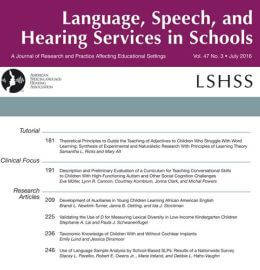Description and Preliminary Evaluation of a Curriculum for Teaching Conversational Skills to Children With High-Functioning Autism and Other Social Cognition Challenges
Müller, E., Cannon, L.R., Kornblum, C., Clark, J., & Powers, M.
July 1, 2016
This pilot study examined the outcomes of an intervention (i.e., Conversation Club) that was, in part, inspired by the Unthinkables in the Superflex Curriculum as well as other core Social Thinking Vocabulary. By using cartoon-characters to facilitate thinking about the importance of each conversational skill, students were taught why conversations matter and how they impact others’ emotions. This study builds on the Crooke, et al. (2008) study’s assertion that building an individual’s capacity to understand the underlying reason for social communication may be more meaningful than simply teaching rote social skills.
Purpose: The purpose of this clinical focus article is to provide (a) a detailed description of a school-based intervention designed to teach children with high-functioning autism spectrum disorders (HF-ASDs) and other social cognition challenges both the how and the why of conversation and (b) a preliminary evaluation of program outcomes.
Method: This pilot study involved (a) qualitative and quantitative analysis of video footage of participants' conversational skills at baseline, during intervention, and postintervention; (b) interviews with participants' speech-language pathologist (third author) about individual participant progress; and (c) interviews with instructors responsible for implementing the curriculum regarding overall program effectiveness. Participants were four elementary-aged children with HF-ASDs and other social cognition challenges with deficits in expressive language and auditory processing and comprehension.
Conclusions: Preliminary findings from this pilot study suggest that providing comprehensive instruction in many of the basic components required for successful conversation, including explanations for why these components are necessary, may be a promising means of teaching children with HF-ASDs and other social cognition challenges to engage in successful peer-to-peer conversation.










 Please note, this journal requires purchase or login for complete access
Please note, this journal requires purchase or login for complete access